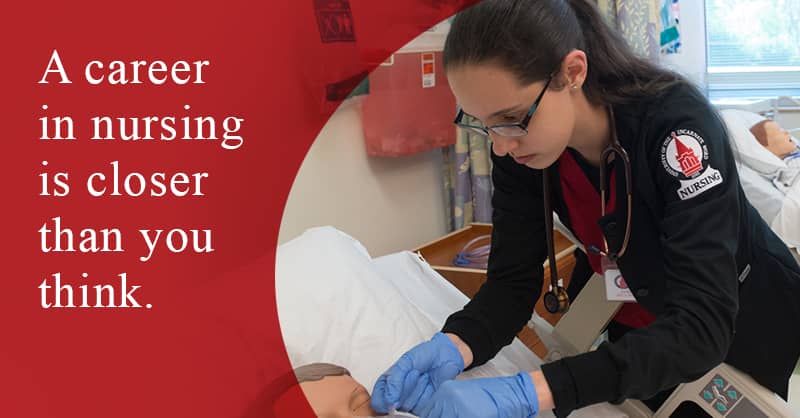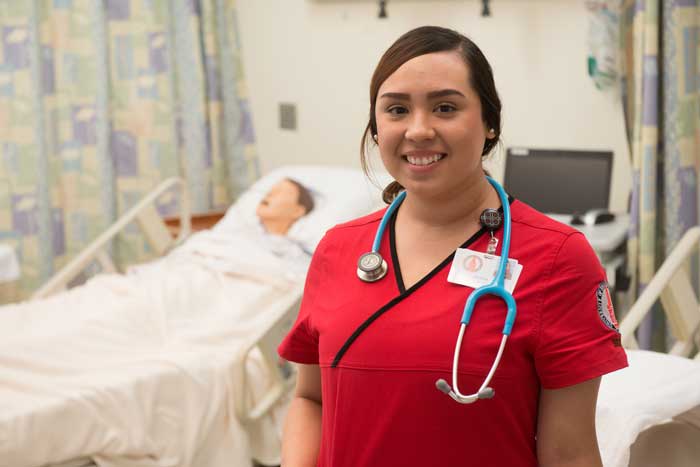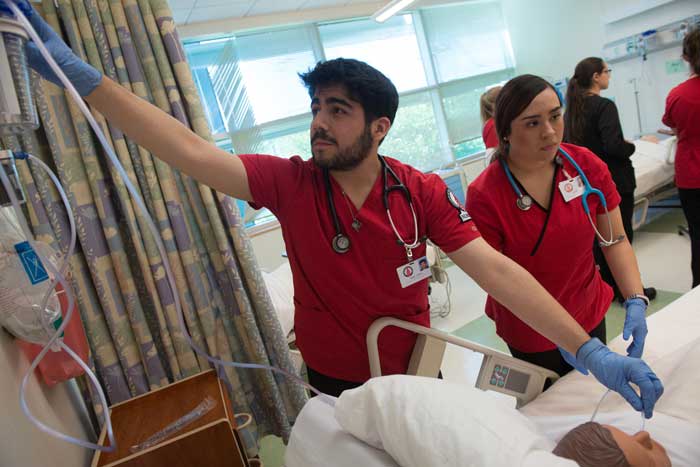Why Choose Nursing as a Second Career?
Each blog post is dated and contains accurate information as of that date. Certain information may have changed since the blog post publication date. If you would like to confirm the current accuracy of blog information, please visit our ABSN program overview page or contact us at (855) 831-3745.

Does your current job leave you weary and wanting more? The days of being stuck in one job for life have come and gone. Whether you are bored in your current role, seeking better pay, or just want a challenge — chances are, that you will eventually feel the pull to seek out a new career direction. Why not consider nursing as a second career?
Maybe you already have a bachelor’s degree. Fortunately, second-degree nursing programs — like the University of the Incarnate Word’s Accelerated Bachelor of Science in Nursing (ABSN) track — allow you to earn a nursing degree in as few as 16 months.
Here are some of the many reasons to choose nursing as a second career.
1. Job Security
Nurses are in high demand. About a third of RNs will reach retirement age within the next 15 years. Add to that the aging-related medical needs of the baby boomer generation, along with a nationwide increase in chronic conditions like obesity and diabetes, and the growing need for new nurses becomes clear.
Our healthcare system’s focus on preventive care and a surge in the number of Americans with medical insurance make nursing synonymous with job security. In fact, the state of Texas is on track to experience a 17 percent growth in employment for nurses from 2018 to 2028.

2. Choice of Settings
The field of nursing offers diverse work experiences and settings. Those earning a BSN degree can elect to work in a wide variety of settings such as:
- Hospitals
- Outpatient clinics
- Private practice
- Senior care facilities
- School systems
- Military bases
- Travel nursing
And there is a wide array of specialty areas of nursing practice, including:
- Pediatrics
- Hospice
- Labor and delivery
- Psychiatric care
- Oncology
- Emergency medicine
- Forensic nursing
3. A Noble Pursuit
Nursing is a well-respected and trusted profession. For the 19th year in a row, it has been named the foremost ethical and honest occupation, according to a Gallup poll.
4. Variety
Every day spent as a nurse is different. No two patients are alike, so each day presents a unique set of challenges. Some key duties of nurses include:
- Performing physical exams
- Obtaining medical/health histories
- Providing patients with counseling and education
- Administering medications
- Taking part in the coordination of patient care
- Supervising LPNs and nursing assistants
- Making critical decisions
5. Upward Mobility
BSN programs can prepare you to take on the role of a leader or nurse manager. And those with a BSN can further advance their careers by pursuing a graduate degree to become a nurse practitioner or nurse anesthetist, for example. This can usually be accomplished with two to four years of additional education.

6. Flexible Scheduling
Nurses typically have flexible schedules. Some nurses work 12-hour shifts, which allows for several days off per week. Some enjoy rotating weekends off. Nurses may choose to work full-time, part-time or on an as-needed basis. And they can opt to work day, evening or night shifts. It’s worth noting that nurses who work the night shift often earn a shift differential.
7. Geographic Mobility
A nursing degree allows you to be mobile. You can find a nursing job virtually anywhere in the US. The Nurse Licensure Compact (NLC), adopted across the majority of U.S. states (including Texas), allows a nurse to hold one multi-state license. This means that they can practice in their home state as well as other Compact states.
8. Competitive Pay
The median annual salary for a nurse in Texas is $75,320. And the median salary of a registered nurse in the U.S. is $75,330. This is much higher than the median annual salary for all occupations, which is $56,310.
These are all great reasons to consider nursing as a second career, but why should you choose the UIW Accelerated BSN track?
How Our Accelerated Nursing Track Works
You can start now and receive credit for previous schooling. With three start dates per year — in January, May and August — we have one that works for you.
You can complete our 62-credit ABSN track in as few as 16 months. There are a few prerequisites to complete, but you needn’t start a brand-new bachelor’s degree program from the beginning. The ABSN track at UIW allows you to start where you are — giving you credit for your previous education so you can focus exclusively on your nursing coursework.
One of our dedicated ABSN admissions counselors will be happy to answer your questions and help you determine whether nursing as a second career is right for you. You have nothing to lose; at no point during the admissions process are you obligated to attend our University.
Take advantage of our comprehensive learning model.
The UIW ABSN track focuses on treating the whole patient — in body, mind and spirit. It is comprised of three components:
- Online coursework through the Canvas learning management platform. Whether you are an aural, social, visual or tactile learner, our original online coursework is designed for you.
- Nursing labs, where you will practice skills — such as checking vitals, conducting physical assessments, inserting IVs and catheters, and dressing wounds — and participate in simulated clinical scenarios, all without fear of putting patients’ safety at risk.
- Clinical rotations, where you will gain real-life experience in a variety of care settings. You will earn more than 900 hours of clinical experience through health systems such as CHRISTUS Health and Methodist Healthcare.
We have a great reputation.
Our ABSN track employs the academic rigor it takes to prepare for the National Council Licensure Exam (NCLEX). We even build NCLEX-RN® test prep into our curriculum, with tests written in the style of the exam. In 2018, 100% of UIW Bachelor of Science in Nursing graduates who took the NCLEX passed on their first try.
Choose the University of the Incarnate Word ABSN Track.
No matter what your reason is for wanting to pursue nursing as a second career, if you hold a non-nursing bachelor’s degree, the UIW ABSN track can help you get there sooner. Contact us today and start your path toward a career in nursing.
